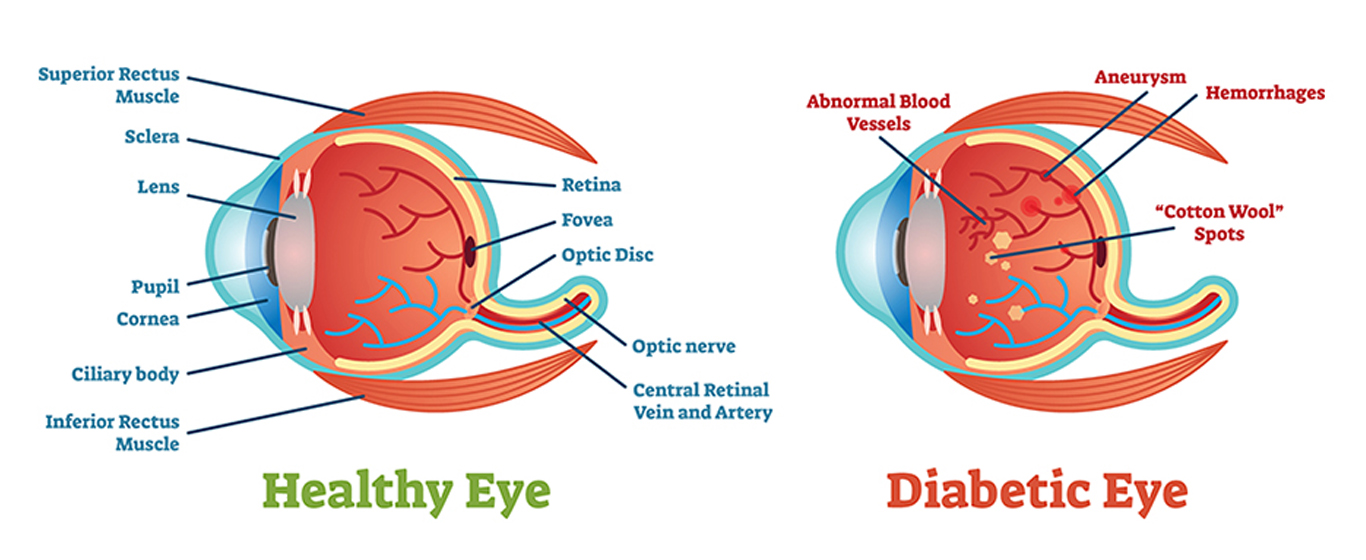
Diabetic retinopathy, a complication of diabetes affects the eyes and it can lead to vision impairment or blindness. Ayurveda, the ancient Indian system of medicine, offers various treatments aimed at managing and potentially reversing the effects of diabetic retinopathy.
Did you know what is Diabetic retinopathy and how it starts? Diabetes reoccurs when the blood vessels in the retina and the tissue at the back of the eye get damaged. Diabetes, as we know, is caused by high blood sugar levels.
The World Health Organization (WHO) reported that 31.7 million people in India had diabetes mellitus (DM) in 2000. This number is projected to increase to 79.4 million by 2030, making it the highest in any country globally.
What is Diabetic retinopathy in Ayurveda ?
Ayurveda, with its unique perspective and comprehensive understanding, provides a profound insight into the nature of this condition. Diabetic retinopathy, known as Dristipatalagata yoga, is primarily attributed to Sira Srotasabhisyandam and Raktavaha roto drishty, often due to various food habits which are not beneficial for eyes and vihara factors, especially in Prameha (diabetes) patients.
To truly grasp the complete pathogenesis of diabetic retinopathy in Ayurveda, it is crucial to delve into the intricate principles of disease pathogenesis. The nidana (causative factors) of endogenous eye diseases are primarily Achakshyushya (harmful) factors that impair the quality of Pitta, impacting the Pitta channels responsible for carrying Pitta. The raktavaha srotas or the channels carrying blood also become vitiated or perverted.
Ultimately, the vitiated doshas move through the channels above the clavicle and settle in the eyes, leading to the manifestation of diabetic retinopathy. The entire pathology of diabetic retinopathy begins with the impairment of Raktavaha srotas, personifying as microangiopathy or disease of the capillaries (very small blood vessels). This includes Atti Pravriti (hyperactivity), Sanga (blockage), and Granthi (nodules), which correspond to hemorrhages, and irregular constriction and dilatation of venules in the retina.
Factors Impacting the Development of Diabetic Retinopathy
Several predisposing factors influence the development of eye disease associated with prameha. These include:
- The patient’s pitta prakriti (constitution).
- Hereditary factors.
- Pitta-Kapha predominant seasons, foods, and psychological stress factors such as anger (krodha) and grief (soka) contribute to Pitta’s vitiation.
Due to their similar properties, vitiated Pitta merges with Rakta dhatu (blood tissue). Together, these factors cause significant changes in the vessels of Dristipatalm, damaging their texture and increasing permeability.
Diabetic Retinopathy Stages
Prameha/Madhumehajanya Timir, or diabetic retinopathy, involves all three doshas (Vata, Pitta, Kapha), the rakta dosha (blood), and the sapta dhatus (seven bodily tissues). It affects the four internal layers of the eye at different stages of the disease.Diabetic retinopathy is a chronic eye disorder that Ayurveda classified it into two types and four stages.
Types:
- Non-proliferative: The early stages of the disease.
- Proliferative: The advanced stage of the disease.
Stages:
- Mild non-proliferative diabetic retinopathy
It is the earliest stage where slight swellings, known as microaneurysms, appear in the retina’s blood vessels. Small portions of fluid can trickle into the retina, causing swelling in the macula (a central part of the retina).
- Moderate non-proliferative diabetic retinopathy
- As the blood vessels swell, blood flow to the retina is disrupted, and fluid builds up in the macula.
- Severe non-proliferative diabetic retinopathy
- During stage 3, a greater number of blood vessels in the retina start locking, greatly reducing blood flow. The body responds by signaling the growth of new blood vessels in the retina.
4.Stage Proliferative diabetic retinopathy
- In this advanced stage, new blood vessels form in the retina. These new vessels are often fragile and prone to leaking, causing vision problems like blurriness, a reduced field of vision, and potentially blindness. And one thing that’s important to note is that these stages of diabetic retinopathy are defined by their pathology.
Diabetic Retinopathy Ayurvedic Treatment
Diabetic Retinopathy Ayurvedic Treatment focuses on correcting and preventing etio-pathological mechanisms (Samprapti Vighatana). Based on the described mechanisms, the primary concern should be the prevention of Madhumeha. Governing diabetic retinopathy involves:
- Addressing the causes of Madhumeha( Diabetes).
- Managing Urdwaga Raktapitta.
- Treating Avarana.
- Preventing Dhatu kshaya (including oja kshaya).
- Generally preventing Agnimandya.
The eye is not separate from the rest of the body; therefore, treating eye ailments requires addressing the body at the cellular level. Agnimandya at the tissue level, known as Dhatu Agnimandya, can be managed with proper dipana and pachana medications, such as Trikatu churna. These treatments help correct Jatharagni and Dhatwagni according to individual needs.
According to Charak, the treatment for conditions involving blood disorders (Raktapitta and Raktaja Vyadhi) is similar. The recommended treatments include blood-purifying actions, purgation, fasting, and bloodletting. However, bloodletting is not advised for Timir (a specific eye condition). For various stages of diabetic eye disease (Madhumehajanya timir), all procedures except bloodletting should be followed. Both Yogratnakar and Chakradutta have also recommended fasting to treat diseases in general. Since diabetic retinopathy primarily involves Vata and Pitta doshas, along with a Kapha component, Pitta should be treated first because an aggravated dosha is strongest in its own domain.
You Can Also Read For More Posts
How does smoking cause cataracts
10 Best Nutrients that will be Improve Eyesight
To Know More, Talk to our Consultant. Dial +91-8235808080
